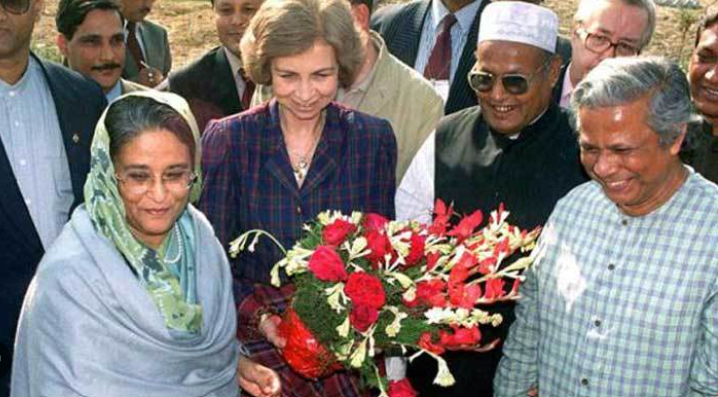Virendra Pandit
New Delhi: Nobel Peace Laureate Muhammad Yunus and three others were on Monday convicted in a labor law court case in Bangladesh and awarded a six-month jail term, the media reported.
Lead prosecutor Khurshid Alam Khan said that Professor Yunus and three of his Grameen Telecom colleagues were convicted under labour laws and sentenced to six months in simple imprisonment. All four were immediately granted bail pending appeals.
Prof Yunus was awarded the Nobel Peace Prize in 2006 for pioneering the use of microcredit and lifting millions out of poverty in the Muslim nation.
He was questioned by Bangladesh’s official anti-graft watchdog, the Anti-corruption Commission, on charges of money laundering and fund embezzlement.
Yunus, chairman of Grameen Telecom, was accused of violating labor laws. A dozen other colleagues of Yunus faced similar charges in the case.
Grameen Telecom owns 34.20 percent shares of Bangladesh’s largest mobile phone company Grameenphone, a subsidiary of Norway’s telecom giant Telenor. Yunus and others were accused of misappropriating over USD 2.28 million from the workers’ fund.
In August, over 170 global leaders and Nobel laureates, in an open letter, urged Bangladeshi Prime Minister Sheikh Hasina to suspend legal proceedings against Yunus.
These leaders, including former US President Barack Obama, former UN Secretary-General Ban Ki-moon, and more than 100 Nobel laureates, said in the letter they were deeply concerned by recent threats to democracy and human rights in Bangladesh.
“We are alarmed that he has recently been targeted by what we believe to be continuous judicial harassment,” they lamented.
In response, PM Hasina welcomed international experts and lawyers to come to Bangladesh to assess the legal proceedings and examine documents involving the charges against Yunus.
In 1983, Yunus founded Grameen Bank, which gives small loans to entrepreneurs who would not usually qualify for bank loans. The bank’s success in lifting people out of poverty led to similar microfinancing efforts in many other countries.
Yunus, 83, is facing more than 100 other charges over labor law violations and alleged corruption. He earned the enmity of longtime Prime Minister Sheikh Hasina, who has accused him of “sucking blood” from the poor. She made several scathing verbal attacks against the internationally respected laureate, who was once seen as a political rival.
Yunus and three colleagues from Grameen Telecom, one of the firms he founded, were accused of violating labor laws when they failed to create a workers’ welfare fund in the company.
All four deny the charges.
“This verdict is unprecedented,” Abdullah Al Mamun, a lawyer for Yunus, said, adding “We did not get justice.”
Yunus told reporters after one of the hearings last month that he had not profited from any of the more than 50 social business firms he had set up in Bangladesh.
“They were not for my benefit,” Yunus said.
Another of his lawyers, Khaja Tanvir, said the case was “meritless, false and ill-motivated…The sole aim of the case is to harass and humiliate him in front of the world.”
Irene Khan, former chief of Amnesty International now working as a United Nations special rapporteur who was present at Monday’s verdict, said the conviction was “a travesty of justice”.
Critics accuse Bangladeshi courts of rubber-stamping decisions made by Hasina’s government, which is all but certain to win another term in power next week at elections boycotted by the opposition.
Her administration has been increasingly firm in its crackdown on political dissent, and Yunus’s popularity among the Bangladeshi public has for years earmarked him as a potential rival.
Amnesty accused the government of “weaponizing labor laws” when Yunus went to trial in September and called for an immediate end to his “harassment”.
Criminal proceedings against Yunus were “a form of political retaliation for his work and dissent”, it said.

